- Home
- Gustave Flaubert
Sentimental Education; Or, The History of a Young Man. Volume 1 Page 7
Sentimental Education; Or, The History of a Young Man. Volume 1 Read online
Page 7
CHAPTER VII.
A Change of Fortune.
Then he had taken his place behind the other passengers in the front ofthe diligence, and when the vehicle began to shake as the five horsesstarted into a brisk trot all at the same time, he allowed himself toplunge into an intoxicating dream of the future. Like an architectdrawing up the plan of a palace, he mapped out his life beforehand. Hefilled it with dainties and with splendours; it rose up to the sky; aprofuse display of allurements could be seen there; and so deeply was heburied in the contemplation of these things that he lost sight of allexternal objects.
At the foot of the hill of Sourdun his attention was directed to thestage which they had reached in their journey. They had travelled onlyabout five kilometres[6] at the most. He was annoyed at this tardy rateof travelling. He pulled down the coach-window in order to get a view ofthe road. He asked the conductor several times at what hour they wouldreach their destination. However, he eventually regained his composure,and remained seated in his corner of the vehicle with eyes wide open.
[Footnote 6: A little over three miles.--Translator.]
The lantern, which hung from the postilion's seat, threw its light onthe buttocks of the shaft-horses. In front, only the manes of the otherhorses could be seen undulating like white billows. Their breathingcaused a kind of fog to gather at each side of the team. The little ironchains of the harness rang; the windows shook in their sashes; and theheavy coach went rolling at an even pace over the pavement. Here andthere could be distinguished the wall of a barn, or else an inn standingby itself. Sometimes, as they entered a village, a baker's oven threwout gleams of light; and the gigantic silhouettes of the horses keptrushing past the walls of the opposite houses. At every change ofhorses, when the harness was unfastened, there was a great silence for aminute. Overhead, under the awning, some passenger might be heardtapping with his feet, while a woman sitting at the threshold of thedoor screened her candle with her hand. Then the conductor would jump onthe footboard, and the vehicle would start on its way again.
At Mormans, the striking of the clocks announced that it was a quarterpast one.
"So then we are in another day," he thought, "we have been in it forsome time!"
But gradually his hopes and his recollections, Nogent, the Rue deChoiseul, Madame Arnoux, and his mother, all got mixed up together.
He was awakened by the dull sound of wheels passing over planks: theywere crossing the Pont de Charenton--it was Paris. Then his twotravelling companions, the first taking off his cap, and the second hissilk handkerchief, put on their hats, and began to chat.
The first, a big, red-faced man in a velvet frock-coat, was a merchant;the second was coming up to the capital to consult a physician; and,fearing that he had disturbed this gentleman during the night, Frederickspontaneously apologised to him, so much had the young man's heart beensoftened by the feelings of happiness that possessed it. The wharf ofthe wet dock being flooded, no doubt, they went straight ahead; and oncemore they could see green fields. In the distance, tall factory-chimneyswere sending forth their smoke. Then they turned into Ivry. Then droveup a street: all at once, he saw before him the dome of the Pantheon.
The plain, quite broken up, seemed a waste of ruins. The enclosing wallof the fortifications made a horizontal swelling there; and, on thefootpath, on the ground at the side of the road, little branchless treeswere protected by laths bristling with nails. Establishments forchemical products and timber-merchants' yards made their appearancealternately. High gates, like those seen in farm-houses, affordedglimpses, through their opening leaves, of wretched yards within, fullof filth, with puddles of dirty water in the middle of them. Longwine-shops, of the colour of ox's blood, displayed in the first floor,between the windows, two billiard-cues crossing one another, with awreath of painted flowers. Here and there might be noticed a half-builtplaster hut, which had been allowed to remain unfinished. Then thedouble row of houses was no longer interrupted; and over their barefronts enormous tin cigars showed themselves at some distance from eachother, indicating tobacconists' shops. Midwives' signboards representedin each case a matron in a cap rocking a doll under a counterpanetrimmed with lace. The corners of the walls were covered with placards,which, three-quarters torn, were quivering in the wind like rags.Workmen in blouses, brewers' drays, laundresses' and butchers' cartspassed along. A thin rain was falling. It was cold. There was a palesky; but two eyes, which to him were as precious as the sun, wereshining behind the haze.
They had to wait a long time at the barrier, for vendors of poultry,wagoners, and a flock of sheep caused an obstruction there. The sentry,with his great-coat thrown back, walked to and fro in front of his box,to keep himself warm. The clerk who collected the city-dues clambered upto the roof of the diligence, and a cornet-a-piston sent forth aflourish. They went down the boulevard at a quick trot, thewhipple-trees clapping and the traces hanging loose. The lash of thewhip went cracking through the moist air. The conductor uttered hissonorous shout:
"Look alive! look alive! oho!" and the scavengers drew out of the way,the pedestrians sprang back, the mud gushed against the coach-windows;they crossed dung-carts, cabs, and omnibuses. At length, the iron gateof the Jardin des Plantes came into sight.
The Seine, which was of a yellowish colour, almost reached the platformsof the bridges. A cool breath of air issued from it. Frederick inhaledit with his utmost energy, drinking in this good air of Paris, whichseems to contain the effluvia of love and the emanations of theintellect. He was touched with emotion at the first glimpse of ahackney-coach. He gazed with delight on the thresholds of thewine-merchants' shops garnished with straw, on the shoe-blacks withtheir boxes, on the lads who sold groceries as they shook theircoffee-burners. Women hurried along at a jog-trot with umbrellas overtheir heads. He bent forward to try whether he could distinguish theirfaces--chance might have led Madame Arnoux to come out.
The shops displayed their wares. The crowd grew denser; the noise in thestreets grew louder. After passing the Quai Saint-Bernard, the Quai dela Tournelle, and the Quai Montebello, they drove along the QuaiNapoleon. He was anxious to see the windows there; but they were too faraway from him. Then they once more crossed the Seine over the Pont-Neuf,and descended in the direction of the Louvre; and, having traversed theRues Saint-Honore, Croix des Petits-Champs, and Du Bouloi, he reachedthe Rue Coq-Heron, and entered the courtyard of the hotel.
To make his enjoyment last the longer, Frederick dressed himself asslowly as possible, and even walked as far as the Boulevard Montmartre.He smiled at the thought of presently beholding once more the belovedname on the marble plate. He cast a glance upwards; there was no longera trace of the display in the windows, the pictures, or anything else.
He hastened to the Rue de Choiseul. M. and Madame Arnoux no longerresided there, and a woman next door was keeping an eye on the porter'slodge. Frederick waited to see the porter himself. After some time hemade his appearance--it was no longer the same man. He did not knowtheir address.
Frederick went into a cafe, and, while at breakfast, consulted theCommercial Directory. There were three hundred Arnoux in it, but noJacques Arnoux. Where, then, were they living? Pellerin ought to know.
He made his way to the very top of the Faubourg Poissonniere, to theartist's studio. As the door had neither a bell nor a knocker, he rappedloudly on it with his knuckles, and then called out--shouted. But theonly response was the echo of his voice from the empty house.
After this he thought of Hussonnet; but where could he discover a man ofthat sort? On one occasion he had waited on Hussonnet when the latterwas paying a visit to his mistress's house in the Rue de Fleurus.Frederick had just reached the Rue de Fleurus when he became consciousof the fact that he did not even know the lady's name.
He had recourse to the Prefecture of Police. He wandered from staircaseto staircase, from office to office. He found that the IntelligenceDepartment was closed for the day, and was told to come back again nextmorning.
Then he called at all the picture-dealers' shops that he could discover,and enquired whether they could give him any information as to Arnoux'swhereabouts. The only answer he got was that M. Arnoux was no longer inthe trade.
At last, discouraged, weary, sickened, he returned to his hotel, andwent to bed. Just as he was stretching himself between the sheets, anidea flashed upon him which made him leap up with delight:
"Regimbart! what an idiot I was not to think of him before!"
Next morning, at seven o'clock, he arrived in the Rue Notre Dame desVictoires, in front of a dram-shop, where Regimbart was in the habit ofdrinking white wine. It was not yet open. He walked about theneighbourhood, and at the end of about half-an-hour, presented himselfat the place once more. Regimbart had left it.
Frederick rushed out into the street. He fancied that he could evennotice Regimbart's hat some distance away. A hearse and some mourningcoaches intercepted his progress. When they had got out of the way, thevision had disappeared.
Fortunately, he recalled to mind that the Citizen breakfasted every dayat eleven o'clock sharp, at a little restaurant in the Place Gaillon.All he had to do was to wait patiently till then; and, after saunteringabout from the Bourse to the Madeleine, and from the Madeleine to theGymnase, so long that it seemed as if it would never come to an end,Frederick, just as the clocks were striking eleven, entered therestaurant in the Rue Gaillon, certain of finding Regimbart there.
"Don't know!" said the restaurant-keeper, in an unceremonious tone.
Frederick persisted: the man replied:
"I have no longer any acquaintance with him, Monsieur"--and, as hespoke, he raised his eyebrows majestically and shook his head in amysterious fashion.
But, in their last interview, the Citizen had referred to the Alexandresmoking-divan. Frederick swallowed a cake, jumped into a cab, and askedthe driver whether there happened to be anywhere on the heights ofSainte-Genevieve a certain Cafe Alexandre. The cabman drove him to theRue des Francs Bourgeois Saint-Michel, where there was an establishmentof that name, and in answer to his question:
"M. Regimbart, if you please?" the keeper of the cafe said with anunusually gracious smile:
"We have not seen him as yet, Monsieur," while he directed towards hiswife, who sat behind the counter, a look of intelligence. And the nextmoment, turning towards the clock:
"But he'll be here, I hope, in ten minutes, or at most a quarter of anhour. Celestin, hurry with the newspapers! What would Monsieur like totake?"
Though he did not want to take anything, Frederick swallowed a glass ofrum, then a glass of kirsch, then a glass of curacoa, then severalglasses of grog, both cold and hot. He read through that day's _Siecle_,and then read it over again; he examined the caricatures in the_Charivari_ down to the very tissue of the paper. When he had finished,he knew the advertisements by heart. From time to time, the tramp ofboots on the footpath outside reached his ears--it was he! and someone's form would trace its outlines on the window-panes; but itinvariably passed on.
In order to get rid of the sense of weariness he experienced, Frederickshifted his seat. He took up his position at the lower end of the room;then at the right; after that at the left; and he remained in the middleof the bench with his arms stretched out. But a cat, daintily pressingdown the velvet at the back of the seat, startled him by giving a suddenspring, in order to lick up the spots of syrup on the tray; and thechild of the house, an insufferable brat of four, played noisily with arattle on the bar steps. His mother, a pale-faced little woman, withdecayed teeth, was smiling in a stupid sort of way. What in the worldcould Regimbart be doing? Frederick waited for him in an exceedinglymiserable frame of mind.
The rain clattered like hail on the covering of the cab. Through theopening in the muslin curtain he could see the poor horse in the streetmore motionless than a horse made of wood. The stream of water, becomingenormous, trickled down between two spokes of the wheels, and thecoachman was nodding drowsily with the horsecloth wrapped round him forprotection, but fearing lest his fare might give him the slip, he openedthe door every now and then, with the rain dripping from him as iffalling from a mountain torrent; and, if things could get worn out bylooking at them, the clock ought to have by this time been utterlydissolved, so frequently did Frederick rivet his eyes on it. However, itkept going. "Mine host" Alexandre walked up and down repeating, "He'llcome! Cheer up! he'll come!" and, in order to divert his thoughts,talked politics, holding forth at some length. He even carried civilityso far as to propose a game of dominoes.
At length when it was half-past four, Frederick, who had been theresince about twelve, sprang to his feet, and declared that he would notwait any longer.
"I can't understand it at all myself," replied the cafe-keeper, in atone of straightforwardness. "This is the first time that M. Ledoux hasfailed to come!"
"What! Monsieur Ledoux?"
"Why, yes, Monsieur!"
"I said Regimbart," exclaimed Frederick, exasperated.
"Ah! a thousand pardons! You are making a mistake! Madame Alexandre, didnot Monsieur say M. Ledoux?"
And, questioning the waiter: "You heard him yourself, just as I did?"
No doubt, to pay his master off for old scores, the waiter contentedhimself with smiling.
Frederick drove back to the boulevards, indignant at having his timewasted, raging against the Citizen, but craving for his presence as iffor that of a god, and firmly resolved to drag him forth, if necessary,from the depths of the most remote cellars. The vehicle in which he wasdriving only irritated him the more, and he accordingly got rid of it.His ideas were in a state of confusion. Then all the names of the cafeswhich he had heard pronounced by that idiot burst forth at the same timefrom his memory like the thousand pieces of an exhibition offireworks--the Cafe Gascard, the Cafe Grimbert, the Cafe Halbout, theBordelais smoking-divan, the Havanais, the Havrais, the Boeuf a laMode, the Brasserie Allemande, and the Mere Morel; and he made his wayto all of them in succession. But in one he was told that Regimbart hadjust gone out; in another, that he might perhaps call at a later hour;in a third, that they had not seen him for six months; and, in anotherplace, that he had the day before ordered a leg of mutton for Saturday.Finally, at Vautier's dining-rooms, Frederick, on opening the door,knocked against the waiter.
"Do you know M. Regimbart?"
"What, monsieur! do I know him? 'Tis I who have the honour of attendingon him. He's upstairs--he is just finishing his dinner!"
And, with a napkin under his arm, the master of the establishmenthimself accosted him:
"You're asking him for M. Regimbart, monsieur? He was here a momentago."
Frederick gave vent to an oath, but the proprietor of the dining-roomsstated that he would find the gentleman as a matter of certainty atBouttevilain's.
"I assure you, on my honour, he left a little earlier than usual, for hehad a business appointment with some gentlemen. But you'll find him, Itell you again, at Bouttevilain's, in the Rue Saint-Martin, No. 92, thesecond row of steps at the left, at the end of the courtyard--firstfloor--door to the right!"
At last, he saw Regimbart, in a cloud of tobacco-smoke, by himself, atthe lower end of the refreshment-room, near the billiard-table, with aglass of beer in front of him, and his chin lowered in a thoughtfulattitude.
"Ah! I have been a long time searching for you!"
Without rising, Regimbart extended towards him only two fingers, and, asif he had seen Frederick the day before, he gave utterance to a numberof commonplace remarks about the opening of the session.
Frederick interrupted him, saying in the most natural tone he couldassume:
"Is Arnoux going on well?"
The reply was a long time coming, as Regimbart was gargling the liquorin his throat:
"Yes, not badly."
"Where is he living now?"
"Why, in the Rue Paradis Poissonniere," the Citizen returned withastonishment.
"What number?"
"Thirty-seven--confound it! what a funny fello
w you are!"
Frederick rose.
"What! are you going?"
"Yes, yes! I have to make a call--some business matter I had forgotten!Good-bye!"
Frederick went from the smoking-divan to the Arnoux's residence, as ifcarried along by a tepid wind, with a sensation of extreme ease such aspeople experience in dreams.
He found himself soon on the second floor in front of a door, at theringing of whose bell a servant appeared. A second door was flung open.Madame Arnoux was seated near the fire. Arnoux jumped up, and rushedacross to embrace Frederick. She had on her lap a little boy not quitethree years old. Her daughter, now as tall as herself, was standing upat the opposite side of the mantelpiece.
"Allow me to present this gentleman to you," said Arnoux, taking his sonup in his arms. And he amused himself for some minutes in making thechild jump up in the air very high, and then catching him with bothhands as he came down.
"You'll kill him!--ah! good heavens, have done!" exclaimed MadameArnoux.
But Arnoux, declaring that there was not the slightest danger, stillkept tossing up the child, and even addressed him in words of endearmentsuch as nurses use in the Marseillaise dialect, his natal tongue: "Ah!my fine picheoun! my ducksy of a little nightingale!"
Then, he asked Frederick why he had been so long without writing tothem, what he had been doing down in the country, and what brought himback.
"As for me, I am at present, my dear friend, a dealer in faience. Butlet us talk about yourself!"
Frederick gave as reasons for his absence a protracted lawsuit and thestate of his mother's health.
He laid special stress on the latter subject in order to make himselfinteresting. He ended by saying that this time he was going to settle inParis for good; and he said nothing about the inheritance, lest it mightbe prejudicial to his past.
The curtains, like the upholstering of the furniture, were of maroondamask wool. Two pillows were close beside one another on the bolster.On the coal-fire a kettle was boiling; and the shade of the lamp, whichstood near the edge of the chest of drawers, darkened the apartment.Madame Arnoux wore a large blue merino dressing-gown. With her faceturned towards the fire and one hand on the shoulder of the little boy,she unfastened with the other the child's bodice. The youngster in hisshirt began to cry, while scratching his head, like the son of M.Alexandre.
Frederick expected that he would have felt spasms of joy; but thepassions grow pale when we find ourselves in an altered situation; and,as he no longer saw Madame Arnoux in the environment wherein he hadknown her, she seemed to him to have lost some of her fascination; tohave degenerated in some way that he could not comprehend--in fact, notto be the same. He was astonished at the serenity of his own heart. Hemade enquiries about some old friends, about Pellerin, amongst others.
"I don't see him often," said Arnoux. She added:
"We no longer entertain as we used to do formerly!"
Was the object of this to let him know that he would get no invitationfrom them? But Arnoux, continuing to exhibit the same cordiality,reproached him for not having come to dine with them uninvited; and heexplained why he had changed his business.
"What are you to do in an age of decadence like ours? Great painting isgone out of fashion! Besides, we may import art into everything. Youknow that, for my part, I am a lover of the beautiful. I must bring youone of these days to see my earthenware works."
And he wanted to show Frederick immediately some of his productions inthe store which he had between the ground-floor and the first floor.
Dishes, soup-tureens, and washhand-basins encumbered the floor. Againstthe walls were laid out large squares of pavement for bathrooms anddressing-rooms, with mythological subjects in the Renaissance style;whilst in the centre, a pair of whatnots, rising up to the ceiling,supported ice-urns, flower-pots, candelabra, little flower-stands, andlarge statuettes of many colours, representing a negro or a shepherdessin the Pompadour fashion. Frederick, who was cold and hungry, was boredwith Arnoux's display of his wares. He hurried off to the Cafe Anglais,where he ordered a sumptuous supper, and while eating, said to himself:
"I was well off enough below there with all my troubles! She scarcelytook any notice of me! How like a shopkeeper's wife!"
And in an abrupt expansion of healthfulness, he formed egoisticresolutions. He felt his heart as hard as the table on which his elbowsrested. So then he could by this time plunge fearlessly into the vortexof society. The thought of the Dambreuses recurred to his mind. He wouldmake use of them. Then he recalled Deslauriers to mind. "Ah! faith, somuch the worse!" Nevertheless, he sent him a note by a messenger, makingan appointment with him for the following day, in order that they mightbreakfast together.
Fortune had not been so kind to the other.
He had presented himself at the examination for a fellowship with athesis on the law of wills, in which he maintained that the powers oftestators ought to be restricted as much as possible; and, as hisadversary provoked him in such a way as to make him say foolish things,he gave utterance to many of these absurdities without in any wayinducing the examiners to falter in deciding that he was wrong. Thenchance so willed it that he should choose by lot, as a subject for alecture, Prescription. Thereupon, Deslauriers gave vent to somelamentable theories: the questions in dispute in former times ought tobe brought forward as well as those which had recently arisen; whyshould the proprietor be deprived of his estate because he could furnishhis title-deeds only after the lapse of thirty-one years? This wasgiving the security of the honest man to the inheritor of the enrichedthief. Every injustice was consecrated by extending this law, which wasa form of tyranny, the abuse of force! He had even exclaimed: "Abolishit; and the Franks will no longer oppress the Gauls, the English oppressthe Irish, the Yankee oppress the Redskins, the Turks oppress the Arabs,the whites oppress the blacks, Poland----"
The President interrupted him: "Well! well! Monsieur, we have nothing todo with your political opinions--you will have them represented in yourbehalf by-and-by!"
Deslauriers did not wish to have his opinions represented; but thisunfortunate Title XX. of the Third Book of the Civil Code had become asort of mountain over which he stumbled. He was elaborating a great workon "Prescription considered as the Basis of the Civil Law and of the Lawof Nature amongst Peoples"; and he got lost in Dunod, Rogerius, Balbus,Merlin, Vazeille, Savigny, Traplong, and other weighty authorities onthe subject. In order to have more leisure for the purpose of devotinghimself to this task, he had resigned his post of head-clerk. He livedby giving private tuitions and preparing theses; and at the meetings ofnewly-fledged barristers to rehearse legal arguments he frightened byhis display of virulence those who held conservative views, all theyoung doctrinaires who acknowledged M. Guizot as their master--so thatin a certain set he had gained a sort of celebrity, mingled, in a slightdegree, with lack of confidence in him as an individual.
He came to keep the appointment in a big paletot, lined with redflannel, like the one Senecal used to wear in former days.
Human respect on account of the passers-by prevented them from strainingone another long in an embrace of friendship; and they made their way toVefour's arm-in-arm, laughing pleasantly, though with tear-dropslingering in the depths of their eyes. Then, as soon as they were freefrom observation, Deslauriers exclaimed:
"Ah! damn it! we'll have a jolly time of it now!"
Frederick was not quite pleased to find Deslauriers all at onceassociating himself in this way with his own newly-acquiredinheritance. His friend exhibited too much pleasure on account of themboth, and not enough on his account alone.
After this, Deslauriers gave details about the reverse he had met with,and gradually told Frederick all about his occupations and his dailyexistence, speaking of himself in a stoical fashion, and of others intones of intense bitterness. He found fault with everything; there wasnot a man in office who was not an idiot or a rascal. He flew into apassion against the waiter for having a glass badly rinsed, and, w
henFrederick uttered a reproach with a view to mitigating his wrath: "As ifI were going to annoy myself with such numbskulls, who, you must know,can earn as much as six and even eight thousand francs a year, who areelectors, perhaps eligible as candidates. Ah! no, no!"
Then, with a sprightly air, "But I've forgotten that I'm talking to acapitalist, to a Mondor,[7] for you are a Mondor now!"
[Footnote 7: Mondor was a celebrated Italian charlatan, who,in the seventeenth century, settled in Paris and made a largefortune.--Translator.]
And, coming back to the question of the inheritance, he gave expressionto this view--that collateral successorship (a thing unjust in itself,though in the present case he was glad it was possible) would beabolished one of these days at the approaching revolution.
"Do you believe in that?" said Frederick.
"Be sure of it!" he replied. "This sort of thing cannot last. There istoo much suffering. When I see into the wretchedness of men likeSenecal----"
"Always Senecal!" thought Frederick.
"But, at all events, tell me the news? Are you still in love with MadameArnoux? Is it all over--eh?"
Frederick, not knowing what answer to give him, closed his eyes and hungdown his head.
With regard to Arnoux, Deslauriers told him that the journal was now theproperty of Hussonnet, who had transformed it. It was called "_L'Art_, aliterary institution--a company with shares of one hundred francs each;capital of the firm, forty thousand francs," each shareholder having theright to put into it his own contributions; for "the company has for itsobject to publish the works of beginners, to spare talent, perchancegenius, the sad crises which drench," etc.
"You see the dodge!" There was, however, something to be effected by thechange--the tone of the journal could be raised; then, without anydelay, while retaining the same writers, and promising a continuation ofthe feuilleton, to supply the subscribers with a political organ: theamount to be advanced would not be very great.
"What do you think of it? Come! would you like to have a hand in it?"
Frederick did not reject the proposal; but he pointed out that it wasnecessary for him to attend to the regulation of his affairs.
"After that, if you require anything----"
"Thanks, my boy!" said Deslauriers.
Then, they smoked puros, leaning with their elbows on the shelf coveredwith velvet beside the window. The sun was shining; the air was balmy.Flocks of birds, fluttering about, swooped down into the garden. Thestatues of bronze and marble, washed by the rain, were glistening.Nursery-maids wearing aprons, were seated on chairs, chatting together;and the laughter of children could be heard mingling with the continuousplash that came from the sheaf-jets of the fountain.
Frederick was troubled by Deslauriers' irritability; but under theinfluence of the wine which circulated through his veins, half-asleep,in a state of torpor, with the sun shining full on his face, he was nolonger conscious of anything save a profound sense of comfort, a kind ofvoluptuous feeling that stupefied him, as a plant is saturated with heatand moisture. Deslauriers, with half-closed eyelids, was staringvacantly into the distance. His breast swelled, and he broke out in thefollowing strain:
"Ah! those were better days when Camille Desmoulins, standing belowthere on a table, drove the people on to the Bastille. Men really livedin those times; they could assert themselves, and prove their strength!Simple advocates commanded generals. Kings were beaten by beggars;whilst now----"
He stopped, then added all of a sudden:
"Pooh! the future is big with great things!"
And, drumming a battle-march on the window-panes, he declaimed someverses of Barthelemy, which ran thus:
"'That dread Assembly shall again appear, Which, after forty years, fills you with fear, Marching with giant stride and dauntless soul'[8]
--I don't know the rest of it! But 'tis late; suppose we go?"
[Footnote 8: "Elle reparaitra, la terrible Assemblee, Dont, apres quarante ans, votre tete est troublee, Colosse qui sans peur marche d'un pas puissant."]
And he went on setting forth his theories in the street.
Frederick, without listening to him, was looking at certain materialsand articles of furniture in the shop-windows which would be suitablefor his new residence in Paris; and it was, perhaps, the thought ofMadame Arnoux that made him stop before a second-hand dealer's window,where three plates made of fine ware were exposed to view. They weredecorated with yellow arabesques with metallic reflections, and wereworth a hundred crowns apiece. He got them put by.
"For my part, if I were in your place," said Deslauriers, "I wouldrather buy silver plate," revealing by this love of substantial thingsthe man of mean extraction.
As soon as he was alone, Frederick repaired to the establishment of thecelebrated Pomadere, where he ordered three pairs of trousers, twocoats, a pelisse trimmed with fur, and five waistcoats. Then he calledat a bootmaker's, a shirtmaker's, and a hatter's, giving them directionsin each shop to make the greatest possible haste. Three days later, onthe evening of his return from Havre, he found his complete wardrobeawaiting him in his Parisian abode; and impatient to make use of it, heresolved to pay an immediate visit to the Dambreuses. But it was tooearly yet--scarcely eight o'clock.
"Suppose I went to see the others?" said he to himself.
He came upon Arnoux, all alone, in the act of shaving in front of hisglass. The latter proposed to drive him to a place where they couldamuse themselves, and when M. Dambreuse was referred to, "Ah, that'sjust lucky! You'll see some of his friends there. Come on, then! It willbe good fun!"
Frederick asked to be excused. Madame Arnoux recognised his voice, andwished him good-day, through the partition, for her daughter wasindisposed, and she was also rather unwell herself. The noise of asoup-ladle against a glass could be heard from within, and all thosequivering sounds made by things being lightly moved about, which areusual in a sick-room. Then Arnoux left his dressing-room to say good-byeto his wife. He brought forward a heap of reasons for going out:
"You know well that it is a serious matter! I must go there; 'tis a caseof necessity. They'll be waiting for me!"
"Go, go, my dear! Amuse yourself!"
Arnoux hailed a hackney-coach:
"Palais Royal, No. 7 Montpensier Gallery." And, as he let himself sinkback in the cushions:
"Ah! how tired I am, my dear fellow! It will be the death of me!However, I can tell it to you--to you!"
He bent towards Frederick's ear in a mysterious fashion:
"I am trying to discover again the red of Chinese copper!"
And he explained the nature of the glaze and the little fire.
On their arrival at Chevet's shop, a large hamper was brought to him,which he stowed away in the hackney-coach. Then he bought for his "poorwife" pine-apples and various dainties, and directed that they should besent early next morning.
After this, they called at a costumer's establishment; it was to a ballthey were going.
Arnoux selected blue velvet breeches, a vest of the same material, and ared wig; Frederick a domino; and they went down the Rue de Laval towardsa house the second floor of which was illuminated by coloured lanterns.
At the foot of the stairs they heard violins playing above.
"Where the deuce are you bringing me to?" said Frederick.
"To see a nice girl! don't be afraid!"
The door was opened for them by a groom; and they entered the anteroom,where paletots, mantles, and shawls were thrown together in a heap onsome chairs. A young woman in the costume of a dragoon of Louis XIV.'sreign was passing at that moment. It was Mademoiselle Rosanette Bron,the mistress of the place.
"Well?" said Arnoux.
"'Tis done!" she replied.
"Ah! thanks, my angel!"
And he wanted to kiss her.
"Take care, now, you foolish man! You'll spoil the paint on my face!"
Arnoux introduced Frederick.
"Step in there, Monsie
ur; you are quite welcome!"
She drew aside a door-curtain, and cried out with a certain emphasis:
"Here's my lord Arnoux, girl, and a princely friend of his!"
Frederick was at first dazzled by the lights. He could see nothing savesome silk and velvet dresses, naked shoulders, a mass of colours swayingto and fro to the accompaniment of an orchestra hidden behind greenfoliage, between walls hung with yellow silk, with pastel portraits hereand there and crystal chandeliers in the style of Louis XVI.'s period.High lamps, whose globes of roughened glass resembled snowballs, lookeddown on baskets of flowers placed on brackets in the corners; and at theopposite side, at the rear of a second room, smaller in size, one coulddistinguish, in a third, a bed with twisted posts, and at its head aVenetian mirror.
The dancing stopped, and there were bursts of applause, a hubbub ofdelight, as Arnoux was seen advancing with his hamper on his head; theeatables contained in it made a lump in the centre.
"Make way for the lustre!"
Frederick raised his eyes: it was the lustre of old Saxe that hadadorned the shop attached to the office of _L'Art Industriel_. Thememory of former days was brought back to his mind. But a foot-soldierof the line in undress, with that silly expression of countenanceascribed by tradition to conscripts, planted himself right in front ofhim, spreading out his two arms in order to emphasise his astonishment,and, in spite of the hideous black moustaches, unusually pointed, whichdisfigured his face, Frederick recognised his old friend Hussonnet. In ahalf-Alsatian, half-negro kind of gibberish, the Bohemian loaded himwith congratulations, calling him his colonel. Frederick, put out ofcountenance by the crowd of personages assembled around him, was at aloss for an answer. At a tap on the desk from a fiddlestick, thepartners in the dance fell into their places.
They were about sixty in number, the women being for the most partdressed either as village-girls or marchionesses, and the men, who werenearly all of mature age, being got up as wagoners, 'longshoremen, orsailors.
Frederick having taken up his position close to the wall, stared atthose who were going through the quadrille in front of him.
An old beau, dressed like a Venetian Doge in a long gown or purple silk,was dancing with Mademoiselle Rosanette, who wore a green coat, lacedbreeches, and boots of soft leather with gold spurs. The pair in frontof them consisted of an Albanian laden with yataghans and a Swiss girlwith blue eyes and skin white as milk, who looked as plump as a quailwith her chemise-sleeves and red corset exposed to view. In order toturn to account her hair, which fell down to her hips, a tall blonde, awalking lady in the opera, had assumed the part of a female savage; andover her brown swaddling-cloth she displayed nothing save leathernbreeches, glass bracelets, and a tinsel diadem, from which rose a largesheaf of peacock's feathers. In front of her, a gentleman who hadintended to represent Pritchard,[9] muffled up in a grotesquely bigblack coat, was beating time with his elbows on his snuff-box. A littleWatteau shepherd in blue-and-silver, like moonlight, dashed his crookagainst the thyrsus of a Bacchante crowned with grapes, who wore aleopard's skin over her left side, and buskins with gold ribbons. On theother side, a Polish lady, in a spencer of nacarat-coloured velvet, madeher gauze petticoat flutter over her pearl-gray stockings, which roseabove her fashionable pink boots bordered with white fur. She wassmiling on a big-paunched man of forty, disguised as a choir-boy, whowas skipping very high, lifting up his surplice with one hand, and withthe other his red clerical cap. But the queen, the star, wasMademoiselle Loulou, a celebrated dancer at public halls. As she had nowbecome wealthy, she wore a large lace collar over her vest of smoothblack velvet; and her wide trousers of poppy-coloured silk, clingingclosely to her figure, and drawn tight round her waist by a cashmerescarf, had all over their seams little natural white camellias. Her paleface, a little puffed, and with the nose somewhat _retrousse_, lookedall the more pert from the disordered appearance of her wig, over whichshe had with a touch of her hand clapped a man's grey felt hat, so thatit covered her right ear; and, with every bounce she made, her pumps,adorned with diamond buckles, nearly reached the nose of her neighbour,a big mediaeval baron, who was quite entangled in his steel armour. Therewas also an angel, with a gold sword in her hand, and two swan's wingsover her back, who kept rushing up and down, every minute losing herpartner who appeared as Louis XIV., displaying an utter ignorance of thefigures and confusing the quadrille.
[Footnote 9: This probably refers to the English astronomer of thatname.--Translator.]
Frederick, as he gazed at these people, experienced a sense offorlornness, a feeling of uneasiness. He was still thinking of MadameArnoux and it seemed to him as if he were taking part in some plot thatwas being hatched against her.
When the quadrille was over, Mademoiselle Rosanette accosted him. Shewas slightly out of breath, and her gorget, polished like a mirror,swelled up softly under her chin.
"And you, Monsieur," said she, "don't you dance?"
Frederick excused himself; he did not know how to dance.
"Really! but with me? Are you quite sure?" And, poising herself on onehip, with her other knee a little drawn back, while she stroked with herleft hand the mother-of-pearl pommel of her sword, she kept staring athim for a minute with a half-beseeching, half-teasing air. At last shesaid "Good night! then," made a pirouette, and disappeared.
Frederick, dissatisfied with himself, and not well knowing what to do,began to wander through the ball-room.
He entered the boudoir padded with pale blue silk, with bouquets offlowers from the fields, whilst on the ceiling, in a circle of giltwood, Cupids, emerging out of an azure sky, played over the clouds,resembling down in appearance. This display of luxuries, which wouldto-day be only trifles to persons like Rosanette, dazzled him, and headmired everything--the artificial convolvuli which adorned the surfaceof the mirror, the curtains on the mantelpiece, the Turkish divan, and asort of tent in a recess in the wall, with pink silk hangings and acovering of white muslin overhead. Furniture made of dark wood withinlaid work of copper filled the sleeping apartment, where, on aplatform covered with swan's-down, stood the large canopied bedsteadtrimmed with ostrich-feathers. Pins, with heads made of precious stones,stuck into pincushions, rings trailing over trays, lockets with hoops ofgold, and little silver chests, could be distinguished in the shadeunder the light shed by a Bohemian urn suspended from three chainlets.Through a little door, which was slightly ajar, could be seen ahot-house occupying the entire breadth of a terrace, with an aviary atthe other end.
Here were surroundings specially calculated to charm him. In a suddenrevolt of his youthful blood he swore that he would enjoy such things;he grew bold; then, coming back to the place opening into thedrawing-room, where there was now a larger gathering--it kept movingabout in a kind of luminous pulverulence--he stood to watch thequadrilles, blinking his eyes to see better, and inhaling the softperfumes of the women, which floated through the atmosphere like animmense kiss.
But, close to him, on the other side of the door, wasPellerin--Pellerin, in full dress, his left arm over his breast and withhis hat and a torn white glove in his right.
"Halloa! 'Tis a long time since we saw you! Where the deuce have youbeen? Gone to travel in Italy? 'Tis a commonplace country enough--Italy,eh? not so unique as people say it is? No matter! Will you bring me yoursketches one of these days?"
And, without giving him time to answer, the artist began talking abouthimself. He had made considerable progress, having definitely satisfiedhimself as to the stupidity of the line. We ought not to look so muchfor beauty and unity in a work as for character and diversity ofsubject.
"For everything exists in nature; therefore, everything is legitimate;everything is plastic. It is only a question of catching the note, mindyou! I have discovered the secret." And giving him a nudge, he repeatedseveral times, "I have discovered the secret, you see! just look at thatlittle woman with the head-dress of a sphinx who is dancing with aRussian postilion--that's neat, dry, fixed, all in flats and in stiffto
nes--indigo under the eyes, a patch of vermilion on the cheek, andbistre on the temples--pif! paf!" And with his thumb he drew, as itwere, pencil-strokes in the air. "Whilst the big one over there," hewent on, pointing towards a fishwife in a cherry gown with a gold crosshanging from her neck, and a lawn fichu fastened round her shoulders,"is nothing but curves. The nostrils are spread out just like theborders of her cap; the corners of the mouth are rising up; the chinsinks: all is fleshy, melting, abundant, tranquil, and sunshiny--a trueRubens! Nevertheless, they are both perfect! Where, then, is the type?"He grew warm with the subject. "What is this but a beautiful woman? Whatis it but the beautiful? Ah! the beautiful--tell me what that is----"
Frederick interrupted him to enquire who was the merry-andrew with theface of a he-goat, who was in the very act of blessing all the dancersin the middle of a pastourelle.
"Oh! he's not much!--a widower, the father of three boys. He leaves themwithout breeches, spends his whole day at the club, and lives with theservant!"
"And who is that dressed like a bailiff talking in the recess of thewindow to a Marquise de Pompadour?"
"The Marquise is Mademoiselle Vandael, formerly an actress at theGymnase, the mistress of the Doge, the Comte de Palazot. They have nowbeen twenty years living together--nobody can tell why. Had she fineeyes at one time, this woman? As for the citizen by her side, his nameis Captain d'Herbigny, an old man of the hurdy-gurdy sort that you canplay on, with nothing in the world except his Cross of the Legion ofHonour and his pension. He passes for the uncle of the grisettes atfestival times, arranges duels, and dines in the city."
"A rascal?" said Frederick.
"No! an honest man!"
"Ha!"
The artist was going on to mention the names of many others, when,perceiving a gentleman who, like Moliere's physician, wore a big blackserge gown opening very wide as it descended in order to display all histrinkets:
"The person who presents himself there before you is Dr. Des Rogis, who,full of rage at not having made a name for himself, has written a bookof medical pornography, and willingly blacks people's boots in society,while he is at the same time discreet. These ladies adore him. He andhis wife (that lean chatelaine in the grey dress) trip about together atevery public place--aye, and at other places too. In spite of domesticembarrassments, they have a _day_--artistic teas, at which verses arerecited. Attention!"
In fact, the doctor came up to them at that moment; and soon they formedall three, at the entrance to the drawing-room, a group of talkers,which was presently augmented by Hussonnet, then by the lover of thefemale savage, a young poet who displayed, under a court cloak ofFrancis I.'s reign, the most pitiful of anatomies, and finally asprightly youth disguised as a Turk of the barrier. But his vest withits yellow galloon had taken so many voyages on the backs of strollingdentists, his wide trousers full of creases, were of so faded a red, histurban, rolled about like an eel in the Tartar fashion, was so poor inappearance--in short, his entire costume was so wretched and made-up,that the women did not attempt to hide their disgust. The doctorconsoled him by pronouncing eulogies on his mistress, the lady in thedress of a 'longshorewoman. This Turk was a banker's son.
Between two quadrilles, Rosanette advanced towards the mantelpiece,where an obese little old man, in a maroon coat with gold buttons, hadseated himself in an armchair. In spite of his withered cheeks, whichfell over his white cravat, his hair, still fair, and curling naturallylike that of a poodle, gave him a certain frivolity of aspect.
She was listening to him with her face bent close to his. Presently, sheaccommodated him with a little glass of syrup; and nothing could be moredainty than her hands under their laced sleeves, which passed over thefacings of her green coat. When the old man had swallowed it, he kissedthem.
"Why, that's M. Oudry, a neighbor of Arnoux!"
"He has lost her!" said Pellerin, smiling.
A Longjumeau postilion caught her by the waist. A waltz was beginning.Then all the women, seated round the drawing-room on benches, rose upquickly at the same time; and their petticoats, their scarfs, and theirhead-dresses went whirling round.
They whirled so close to him that Frederick could notice the beads ofperspiration on their foreheads; and this gyral movement, more and morelively, regular, provocative of dizzy sensations, communicated to hismind a sort of intoxication, which made other images surge up within it,while every woman passed with the same dazzling effect, and each of themwith a special kind of exciting influence, according to her style ofbeauty.
The Polish lady, surrendering herself in a languorous fashion, inspiredhim with a longing to clasp her to his heart while they were bothspinning forward on a sledge along a plain covered with snow. Horizonsof tranquil voluptuousness in a chalet at the side of a lake opened outunder the footsteps of the Swiss girl, who waltzed with her bust erectand her eyelashes drooping. Then, suddenly, the Bacchante, bending backher head with its dark locks, made him dream of devouring caresses in awood of oleanders, in the midst of a storm, to the confusedaccompaniment of tabours. The fishwife, who was panting from therapidity of the music, which was far too great for her, gave vent tobursts of laughter; and he would have liked, while drinking with her insome tavern in the "Porcherons,"[10] to rumple her fichu with bothhands, as in the good old times. But the 'longshorewoman, whose lighttoes barely skimmed the floor, seemed to conceal under the suppleness ofher limbs and the seriousness of her face all the refinements of modernlove, which possesses the exactitude of a science and the mobility of abird. Rosanette was whirling with arms akimbo; her wig, in an awkwardposition, bobbing over her collar, flung iris-powder around her; and, atevery turn, she was near catching hold of Frederick with the ends of hergold spurs.
[Footnote 10: The "Porcherons" was the name given to an old quarter ofParis famous for its taverns, situated between the Rue du FaubourgMontmartre and the Rue de Saint-Lazare.--Translator.]
During the closing bar of the waltz, Mademoiselle Vatnaz made herappearance. She had an Algerian handkerchief on her head, a number ofpiastres on her forehead, antimony at the edges of her eyes, with a kindof paletot made of black cashmere falling over a petticoat of sparklingcolour, with stripes of silver; and in her hand she held a tambourine.
Behind her back came a tall fellow in the classical costume of Dante,who happened to be--she now made no concealment any longer about it--theex-singer of the Alhambra, and who, though his name was AugusteDelamare, had first called himself Antenor Delamarre, then Delmas, thenBelmar, and at last Delmar, thus modifying and perfecting his name, ashis celebrity increased, for he had forsaken the public-house concertfor the theatre, and had even just made his _debut_ in a noisy fashionat the Ambigu in _Gaspardo le Pecheur_.
Hussonnet, on seeing him, knitted his brows. Since his play had beenrejected, he hated actors. It was impossible to conceive the vanity ofindividuals of this sort, and above all of this fellow. "What a prig!Just look at him!"
After a light bow towards Rosanette, Delmar leaned back against themantelpiece; and he remained motionless with one hand over his heart,his left foot thrust forward, his eyes raised towards heaven, with hiswreath of gilt laurels above his cowl, while he strove to put into theexpression of his face a considerable amount of poetry in order tofascinate the ladies. They made, at some distance, a great circle aroundhim.
But the Vatnaz, having given Rosanette a prolonged embrace, came to begof Hussonnet to revise, with a view to the improvement of the style, aneducational work which she intended to publish, under the title of "TheYoung Ladies' Garland," a collection of literature and moral philosophy.
The man of letters promised to assist her in the preparation of thework. Then she asked him whether he could not in one of the prints towhich he had access give her friend a slight puff, and even assign tohim, later, some part. Hussonnet had forgotten to take a glass of punchon account of her.
It was Arnoux who had brewed the beverage; and, followed by the Comte'sgroom carrying an empty tray, he offered it to the ladies with a
self-satisfied air.
When he came to pass in front of M. Oudry, Rosanette stopped him.
"Well--and this little business?"
He coloured slightly; finally, addressing the old man:
"Our fair friend tells me that you would have the kindness----"
"What of that, neighbour? I am quite at your service!"
And M. Dambreuse's name was pronounced. As they were talking to oneanother in low tones, Frederick could only hear indistinctly; and hemade his way to the other side of the mantelpiece, where Rosanette andDelmar were chatting together.
The mummer had a vulgar countenance, made, like the scenery of thestage, to be viewed from a distance--coarse hands, big feet, and a heavyjaw; and he disparaged the most distinguished actors, spoke of poetswith patronising contempt, made use of the expressions "my organ," "myphysique," "my powers," enamelling his conversation with words that werescarcely intelligible even to himself, and for which he had quite anaffection, such as "_morbidezza_," "analogue," and "homogeneity."
Rosanette listened to him with little nods of approbation. One could seeher enthusiasm bursting out under the paint on her cheeks, and a touchof moisture passed like a veil over her bright eyes of an indefinablecolour. How could such a man as this fascinate her? Frederick internallyexcited himself to greater contempt for him, in order to banish,perhaps, the species of envy which he felt with regard to him.
Mademoiselle Vatnaz was now with Arnoux, and, while laughing from timeto time very loudly, she cast glances towards Rosanette, of whom M.Oudry did not lose sight.
Then Arnoux and the Vatnaz disappeared. The old man began talking in asubdued voice to Rosanette.
"Well, yes, 'tis settled then! Leave me alone!"
And she asked Frederick to go and give a look into the kitchen to seewhether Arnoux happened to be there.
A battalion of glasses half-full covered the floor; and the saucepans,the pots, the turbot-kettle, and the frying-stove were all in a state ofcommotion. Arnoux was giving directions to the servants, whom he"thee'd" and "thou'd," beating up the mustard, tasting the sauces, andlarking with the housemaid.
"All right," he said; "tell them 'tis ready! I'm going to have it servedup."
The dancing had ceased. The women came and sat down; the men werewalking about. In the centre of the drawing-room, one of the curtainsstretched over a window was swelling in the wind; and the Sphinx, inspite of the observations of everyone, exposed her sweating arms to thecurrent of air.
Where could Rosanette be? Frederick went on further to find her, eveninto her boudoir and her bedroom. Some, in order to be alone, or to bein pairs, had retreated into the corners. Whisperings intermingled withthe shade. There were little laughs stifled under handkerchiefs, and atthe sides of women's corsages one could catch glimpses of fans quiveringwith slow, gentle movements, like the beating of a wounded bird's wings.
As he entered the hot-house, he saw under the large leaves of a caladiumnear the jet d'eau, Delmar lying on his face on the sofa covered withlinen cloth. Rosanette, seated beside him, had passed her fingersthrough his hair; and they were gazing into each other's faces. At thesame moment, Arnoux came in at the opposite side--that which was nearthe aviary. Delmar sprang to his feet; then he went out at a rapid pace,without turning round; and even paused close to the door to gather ahibiscus flower, with which he adorned his button-hole. Rosanette hungdown her head; Frederick, who caught a sight of her profile, saw thatshe was in tears.
"I say! What's the matter with you?" exclaimed Arnoux.
She shrugged her shoulders without replying.
"Is it on account of him?" he went on.
She threw her arms round his neck, and kissing him on the forehead,slowly:
"You know well that I will always love you, my big fellow! Think no moreabout it! Let us go to supper!"
A copper chandelier with forty wax tapers lighted up the dining-room,the walls of which were hidden from view under some fine old earthenwarethat was hung up there; and this crude light, falling perpendicularly,rendered still whiter, amid the side-dishes and the fruits, a hugeturbot which occupied the centre of the tablecloth, with plates allround filled with crayfish soup. With a rustle of garments, the women,having arranged their skirts, their sleeves, and their scarfs, tooktheir seats beside one another; the men, standing up, posted themselvesat the corners. Pellerin and M. Oudry were placed near Rosanette. Arnouxwas facing her. Palazot and his female companion had just gone out.
"Good-bye to them!" said she. "Now let us begin the attack!"
And the choir-boy, a facetious man with a big sign of the cross, saidgrace.
The ladies were scandalised, and especially the fishwife, the mother ofa young girl of whom she wished to make an honest woman. Neither didArnoux like "that sort of thing," as he considered that religion oughtto be respected.
A German clock with a cock attached to it happening to chime out thehour of two, gave rise to a number of jokes about the cuckoo. All kindsof talk followed--puns, anecdotes, bragging remarks, bets, lies takenfor truth, improbable assertions, a tumult of words, which soon becamedispersed in the form of chats between particular individuals. The wineswent round; the dishes succeeded each other; the doctor carved. Anorange or a cork would every now and then be flung from a distance.People would quit their seats to go and talk to some one at another endof the table. Rosanette turned round towards Delmar, who sat motionlessbehind her; Pellerin kept babbling; M. Oudry smiled. Mademoiselle Vatnazate, almost alone, a group of crayfish, and the shells crackled underher long teeth. The angel, poised on the piano-stool--the only place onwhich her wings permitted her to sit down--was placidly masticatingwithout ever stopping.
"What an appetite!" the choir-boy kept repeating in amazement, "what anappetite!"
And the Sphinx drank brandy, screamed out with her throat full, andwriggled like a demon. Suddenly her jaws swelled, and no longer beingable to keep down the blood which rushed to her head and nearly chokedher, she pressed her napkin against her lips, and threw herself underthe table.
Frederick had seen her falling: "'Tis nothing!" And at his entreaties tobe allowed to go and look after her, she replied slowly:
"Pooh! what's the good? That's just as pleasant as anything else. Lifeis not so amusing!"
Then, he shivered, a feeling of icy sadness taking possession of him, asif he had caught a glimpse of whole worlds of wretchedness anddespair--a chafing-dish of charcoal beside a folding-bed, the corpses ofthe Morgue in leathern aprons, with the tap of cold water that flowsover their heads.
Meanwhile, Hussonnet, squatted at the feet of the female savage, washowling in a hoarse voice in imitation of the actor Grassot:
"Be not cruel, O Celuta! this little family fete is charming! Intoxicateme with delight, my loves! Let us be gay! let us be gay!"
And he began kissing the women on the shoulders. They quivered under thetickling of his moustaches. Then he conceived the idea of breaking aplate against his head by rapping it there with a little energy. Othersfollowed his example. The broken earthenware flew about in bits likeslates in a storm; and the 'longshorewoman exclaimed:
"Don't bother yourselves about it; these cost nothing. We get a presentof them from the merchant who makes them!"
Every eye was riveted on Arnoux. He replied:
"Ha! about the invoice--allow me!" desiring, no doubt, to pass for notbeing, or for no longer being, Rosanette's lover.
But two angry voices here made themselves heard:
"Idiot!"
"Rascal!"
"I am at your command!"
"So am I at yours!"
It was the mediaeval knight and the Russian postilion who were disputing,the latter having maintained that armour dispensed with bravery, whilethe other regarded this view as an insult. He desired to fight; allinterposed to prevent him, and in the midst of the uproar the captaintried to make himself heard.
"Listen to me, messieurs! One word! I have some experience, messieurs!"
Rosanette
, by tapping with her knife on a glass, succeeded eventually inrestoring silence, and, addressing the knight, who had kept his helmeton, and then the postilion, whose head was covered with a hairy cap:
"Take off that saucepan of yours! and you, there, your wolf's head! Areyou going to obey me, damn you? Pray show respect to my epaulets! I amyour commanding officer!"
They complied, and everyone present applauded, exclaiming, "Long livethe Marechale! long live the Marechale!" Then she took a bottle ofchampagne off the stove, and poured out its contents into the cups whichthey successively stretched forth to her. As the table was very large,the guests, especially the women, came over to her side, and stood erecton tiptoe on the slats of the chairs, so as to form, for the space of aminute, a pyramidal group of head-dresses, naked shoulders, extendedarms, and stooping bodies; and over all these objects a spray of wineplayed for some time, for the merry-andrew and Arnoux, at oppositecorners of the dining-room, each letting fly the cork of a bottle,splashed the faces of those around them.
The little birds of the aviary, the door of which had been left open,broke into the apartment, quite scared, flying round the chandelier,knocking against the window-panes and against the furniture, and some ofthem, alighting on the heads of the guests, presented the appearancethere of large flowers.
The musicians had gone. The piano had been drawn out of the anteroom.The Vatnaz seated herself before it, and, accompanied by the choir-boy,who thumped his tambourine, she made a wild dash into a quadrille,striking the keys like a horse pawing the ground, and wriggling herwaist about, the better to mark the time. The Marechale dragged outFrederick; Hussonnet took the windmill; the 'longshorewoman put out herjoints like a circus-clown; the merry-andrew exhibited the manoeuvresof an orang-outang; the female savage, with outspread arms, imitated theswaying motion of a boat. At last, unable to go on any further, they allstopped; and a window was flung open.
The broad daylight penetrated the apartment with the cool breath ofmorning. There was an exclamation of astonishment, and then camesilence. The yellow flames flickered, making the sockets of thecandlesticks crack from time to time. The floor was strewn with ribbons,flowers, and pearls. The pier-tables were sticky with the stains ofpunch and syrup. The hangings were soiled, the dresses rumpled anddusty. The plaits of the women's hair hung loose over their shoulders,and the paint, trickling down with the perspiration, revealed pallidfaces and red, blinking eyelids.
The Marechale, fresh as if she had come out of a bath, had rosy checksand sparkling eyes. She flung her wig some distance away, and her hairfell around her like a fleece, allowing none of her uniform to be seenexcept her breeches, the effect thus produced being at the same timecomical and pretty.
The Sphinx, whose teeth chattered as if she had the ague, wanted ashawl.
Rosanette rushed up to her own room to look for one, and, as the othercame after her, she quickly shut the door in her face.
The Turk remarked, in a loud tone, that M. Oudry had not been seen goingout. Nobody noticed the maliciousness of this observation, so worn outwere they all.
Then, while waiting for vehicles, they managed to get on theirbroad-brimmed hats and cloaks. It struck seven. The angel was still inthe dining-room, seated at the table with a plate of sardines and fruitstewed in melted butter in front of her, and close beside her was thefishwife, smoking cigarettes, while giving her advice as to the rightway to live.
At last, the cabs having arrived, the guests took their departure.Hussonnet, who had an engagement as correspondent for the provinces, hadto read through fifty-three newspapers before his breakfast. The femalesavage had a rehearsal at the theatre; Pellerin had to see a model; andthe choir-boy had three appointments. But the angel, attacked by thepreliminary symptoms of indigestion, was unable to rise. The mediaevalbaron carried her to the cab.
"Take care of her wings!" cried the 'longshorewoman through the window.
At the top of the stairs, Mademoiselle Vatnaz said to Rosanette:
"Good-bye, darling! That was a very nice evening party of yours."
Then, bending close to her ear: "Take care of him!"
"Till better times come," returned the Marechale, in drawling tones, asshe turned her back.
Arnoux and Frederick returned together, just as they had come. Thedealer in faience looked so gloomy that his companion wished to know ifhe were ill.
"I? Not at all!"
He bit his moustache, knitted his brows; and Frederick asked him, was ithis business that annoyed him.
"By no means!"
Then all of a sudden:
"You know him--Pere Oudry--don't you?"
And, with a spiteful expression on his countenance:
"He's rich, the old scoundrel!"
After this, Arnoux spoke about an important piece of ware-making, whichhad to be finished that day at his works. He wanted to see it; thetrain was starting in an hour.
"Meantime, I must go and embrace my wife."
"Ha! his wife!" thought Frederick. Then he made his way home to go tobed, with his head aching terribly; and, to appease his thirst, heswallowed a whole carafe of water.
Another thirst had come to him--the thirst for women, for licentiouspleasure, and all that Parisian life permitted him to enjoy. He feltsomewhat stunned, like a man coming out of a ship, and in the visionsthat haunted his first sleep, he saw the shoulders of the fishwife, theloins of the 'longshorewoman, the calves of the Polish lady, and thehead-dress of the female savage flying past him and coming back againcontinually. Then, two large black eyes, which had not been at the ball,appeared before him; and, light as butterflies, burning as torches, theycame and went, ascended to the cornice and descended to his very mouth.
Frederick made desperate efforts to recognise those eyes, withoutsucceeding in doing so. But already the dream had taken hold of him. Itseemed to him that he was yoked beside Arnoux to the pole of ahackney-coach, and that the Marechale, astride of him, wasdisembowelling him with her gold spurs.

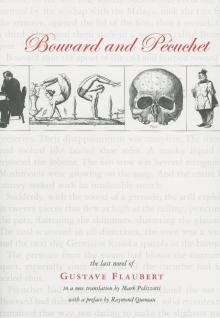 Bouvard and Pecuchet
Bouvard and Pecuchet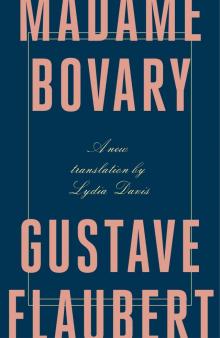 Madame Bovary
Madame Bovary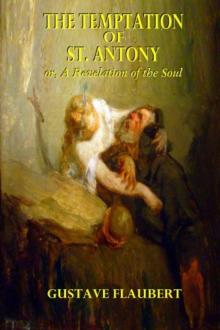 The Temptation of St. Antony
The Temptation of St. Antony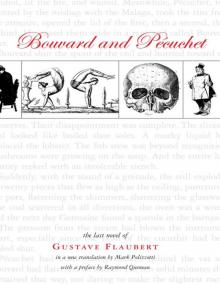 Bouvard and Pécuchet: A Tragi-comic Novel of Bourgeois Life, part 1
Bouvard and Pécuchet: A Tragi-comic Novel of Bourgeois Life, part 1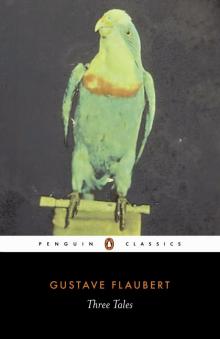 Three Tales
Three Tales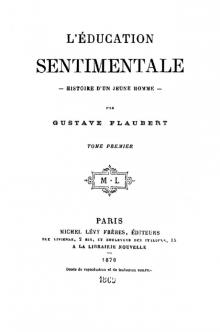 Education sentimentale. English
Education sentimentale. English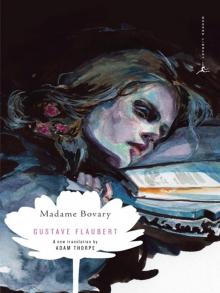 Madame Bovary (Modern Library)
Madame Bovary (Modern Library)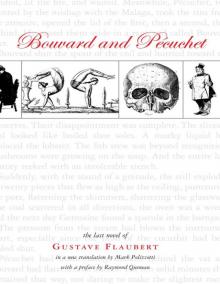 Bouvard and Pécuchet: A Tragi-comic Novel of Bourgeois Life, part 2
Bouvard and Pécuchet: A Tragi-comic Novel of Bourgeois Life, part 2 Sentimental Education; Or, The History of a Young Man. Volume 1
Sentimental Education; Or, The History of a Young Man. Volume 1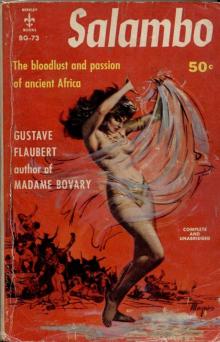 Salammbo
Salammbo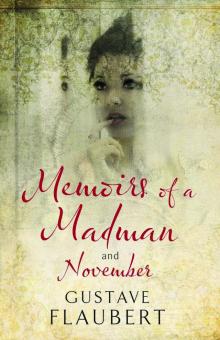 Memoirs of a Madman and November
Memoirs of a Madman and November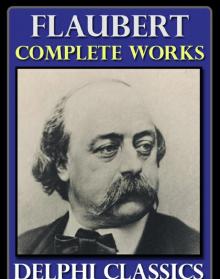 Complete Works of Gustave Flaubert
Complete Works of Gustave Flaubert